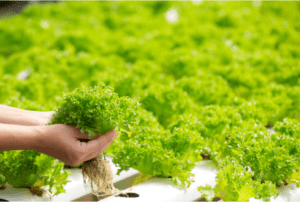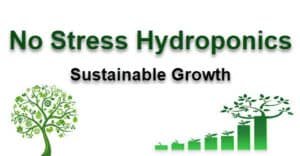There are many reasons why hydroponic farming is a great option for agriculture. Hydroponics is the process of growing plants in water instead of soil. This type of farming is becoming more and more popular because it has a lot of benefits for both the farmer and the environment. If you haven’t tried this way of farming you may be wondering, why is hydroponic farming good? In this blog post, we will cover some of the reasons why hydroponic farming is good for everyone involved!
Why Is Hydroponic Farming Good?
The advantages of hydroponic farming surpass those of conventional field agriculture. Concerns about soil erosion, large water consumption, and food-related illnesses have all plagued traditional field farming techniques. Hydroponic systems are soil-free, water-based farming technologies that eliminate many of the problems that come with soil-based methods. Crop nutrition is supplied through nutrient-rich water rather than soil, eliminating much of the baggage associated with soil cultivation.
No Weed
You’ve undoubtedly experienced how aggravating weeds can be. Trimming weeds is one of the most time-consuming activities for farmers or gardeners. With plowing, tilling, and weeding, the process appears never-ending. Weeds can’t develop in hydroponic systems since they don’t provide the things that other plants require to grow. In comparison to other crops, weeds require the same resources as regular plants in order to germinate, however, seeds are seldom put in hydroponic systems. As a result, rather than targeting the growth phase, the system may be modified to suit it. Because seeds can’t begin growing, weeds will not take root and drain your crops’ nutrients. It’s time to get started now that you’re aware of the advantages of hydroponic farming. Because weed is intrinsically connected to dirt, you won’t have to deal with them when it comes to soilless hydroponic farming.

It Takes up Less Space
Plants must spread their roots in order to discover water and the nutrients they require to survive. This implies that they should be planted at a specific distance apart from one another. Because water and nutrients are supplied directly to hydroponic plants’ roots, they do not need to be spaced as far apart as soil-based plants.
Water Conservation
Did you know that field farms use 80% of the water in the United States? Because so much of it is wasted, field farming uses a lot of water. When water evaporates, rolls off, and puddles away from the body, a significant quantity is lost. That’s a lot of garbage! Because they are delivered in measured amounts, hydroponic systems consume ten times less water. Furthermore, some hydroponics recirculate water, lowering consumption even more!
Fewer Chemicals
The use of hydroponic systems can reduce the likelihood of pests developing in your garden, resulting in less need for pesticides and herbicides. Hydroponics are closely regulated, so there’s no danger of weeds taking over your yard. As a result, herbicides are not required. Pests cannot easily enter hydroponic systems since they are frequently indoors, so pesticides aren’t needed.
Faster Growth
Plants cultivated in hydroponic systems develop 30% to 50% faster than those grown in soil. Crop growth is accelerated in hydroponic environments since they receive sufficient nutrients and, if produced indoors, are subject to less environmental stress (such as weather and pests). Some species grow more quickly than others. Hydroponics is ideal for lettuce and other water-hogging plants.
Nutrient Control
Hydroponic systems use a nutrient solution combined with water to feed plants, allowing the grower better control over which nutrients they absorb. Fertilizers may be required for cultivars cultivated in the soil to survive. However, hydroponic crops already receive all of the assistance they require and just the right amount of it. Make sure you do your homework and take accurate measurements so that the crops will have everything they need to thrive from their own water.
Grow Indoors
Another advantage of hydroponic farming is that it requires very little space. Indoor gardening has several advantages, such as the ability to cultivate all year, temperature and weather control, and fewer pests. Indoor hydroponics are mostly used because of the environmental control they provide. Plants grow stronger and faster in hydroponic systems when compared to soil-based agriculture.
Healthier Plants

Plants grow healthier in hydroponics than in soil. Because there is no soil for these illnesses to fester and spread in, pathogens don’t tend to thrive in hydroponics. Furthermore, since plants do not have to expand their roots out seeking nutrients, they may devote more effort to growing.
Fewer Pests and Ailments
Removing soil protects your plants from soil-borne pests like groundhogs, gophers, and a flock of birds. They’re also less prone to diseases like Fusarium and Rhizoctonia.
Bigger Produce
Because hydroponic farming may produce more per square foot than soil farming, it generally produces more. Plants are also healthier and develop faster in hydroponics, resulting in more fruit over a shorter period of time. Indoor growing conditions also allow for year-round production, regardless of the weather or season, allowing plants to be harvested multiple times after the initial harvest.
No Soil Erosion
In the last 150 years, agricultural techniques have eroded half of Earth’s soil, lowering arable land availability. Hydroponic systems don’t require soil. There isn’t any soil, so there is no soil erosion. It’s that easy.
Relieves Stress
As with any other kind of farming, Hydroponic Gardening is one of the most stress-free pastimes available. It’s the only time you’ll get to connect with nature. So, when you’re stressed out after a long day at the workplace, you can always come home to your tiny Hydroponics garden and start growing plants from scratch again. You may begin by growing fresh, delicious foods and then move on to herbs and fruits if you like. The process is quite soothing whether you go for fresh or herbal/fruity vegetables.

